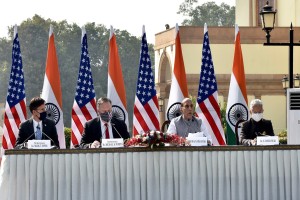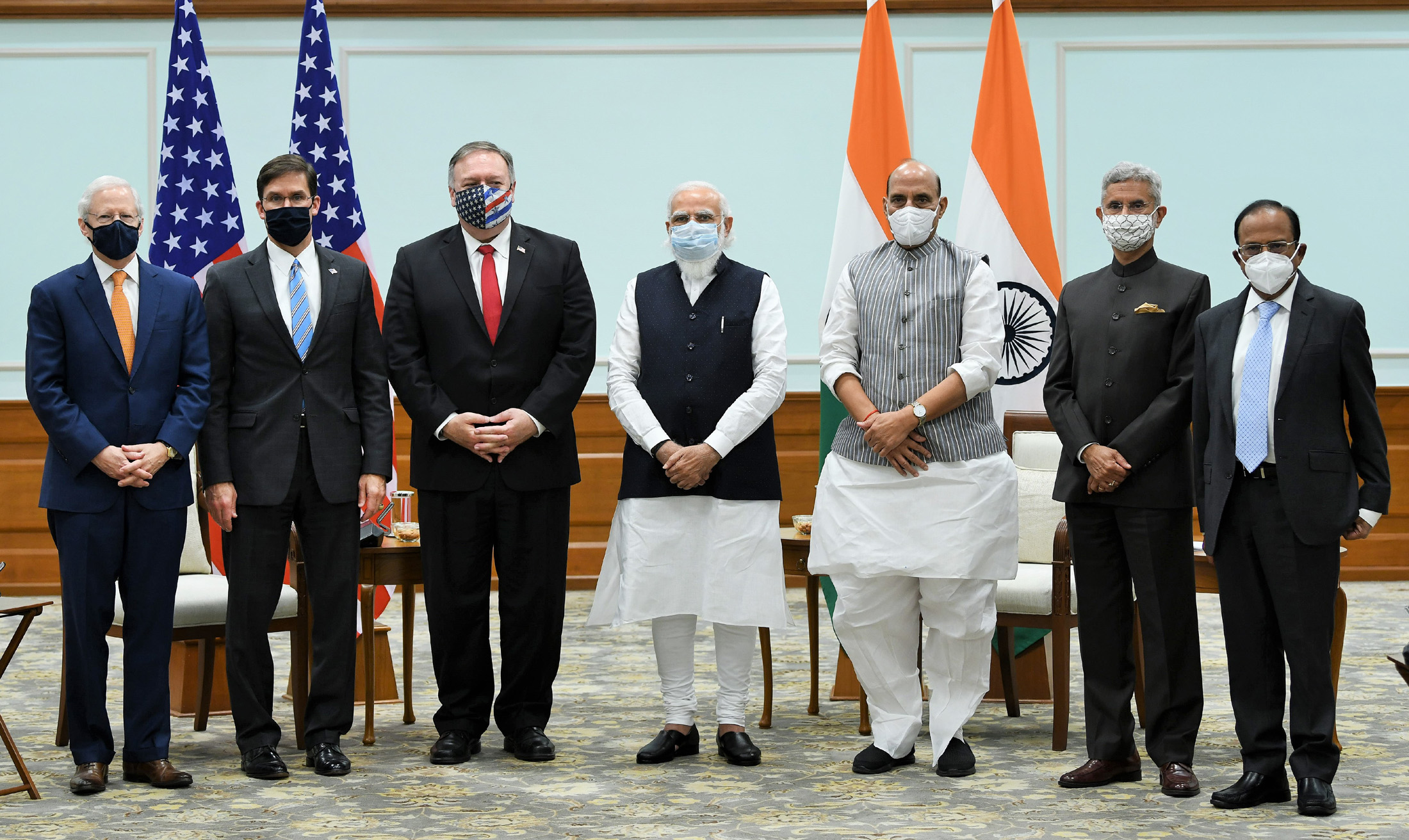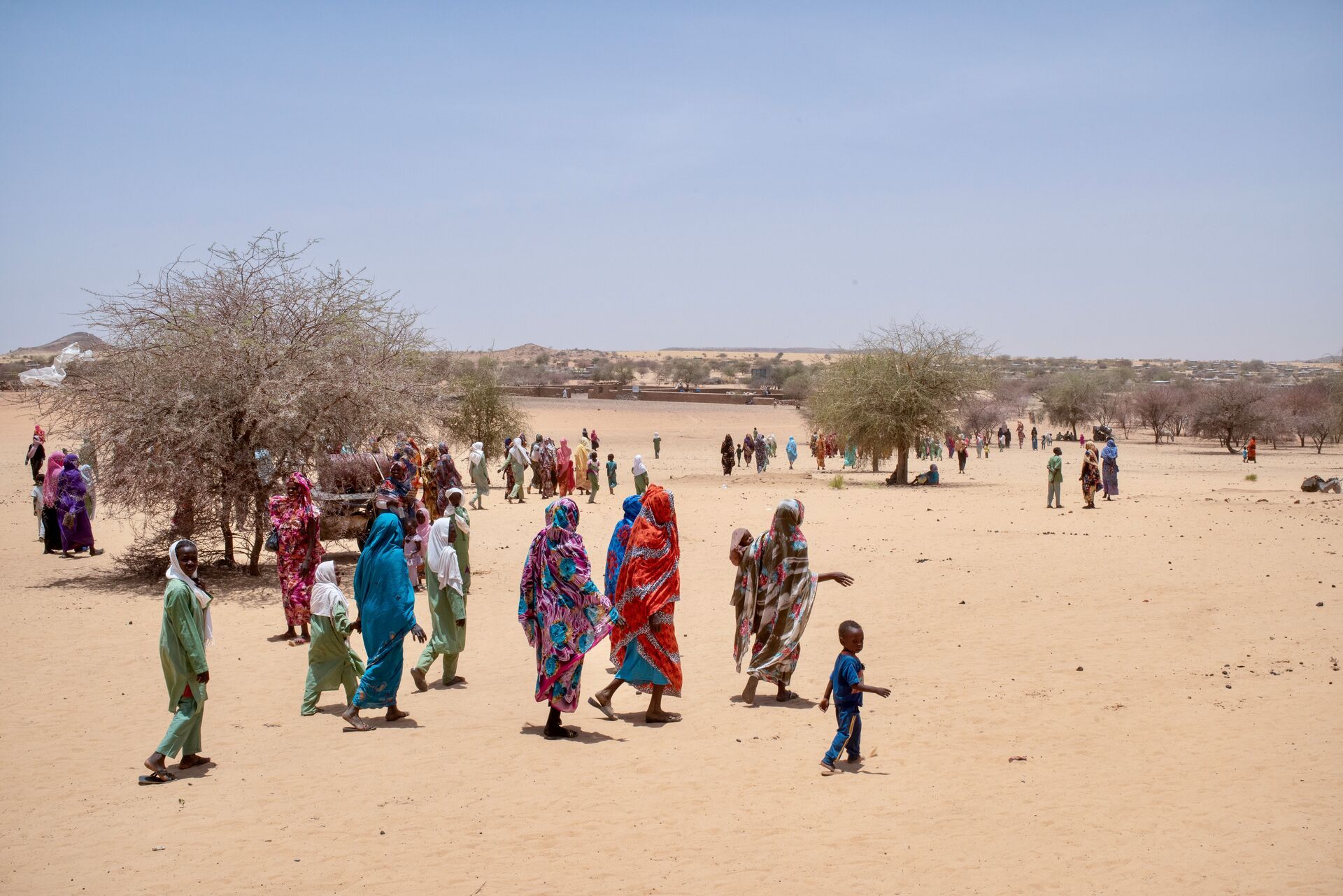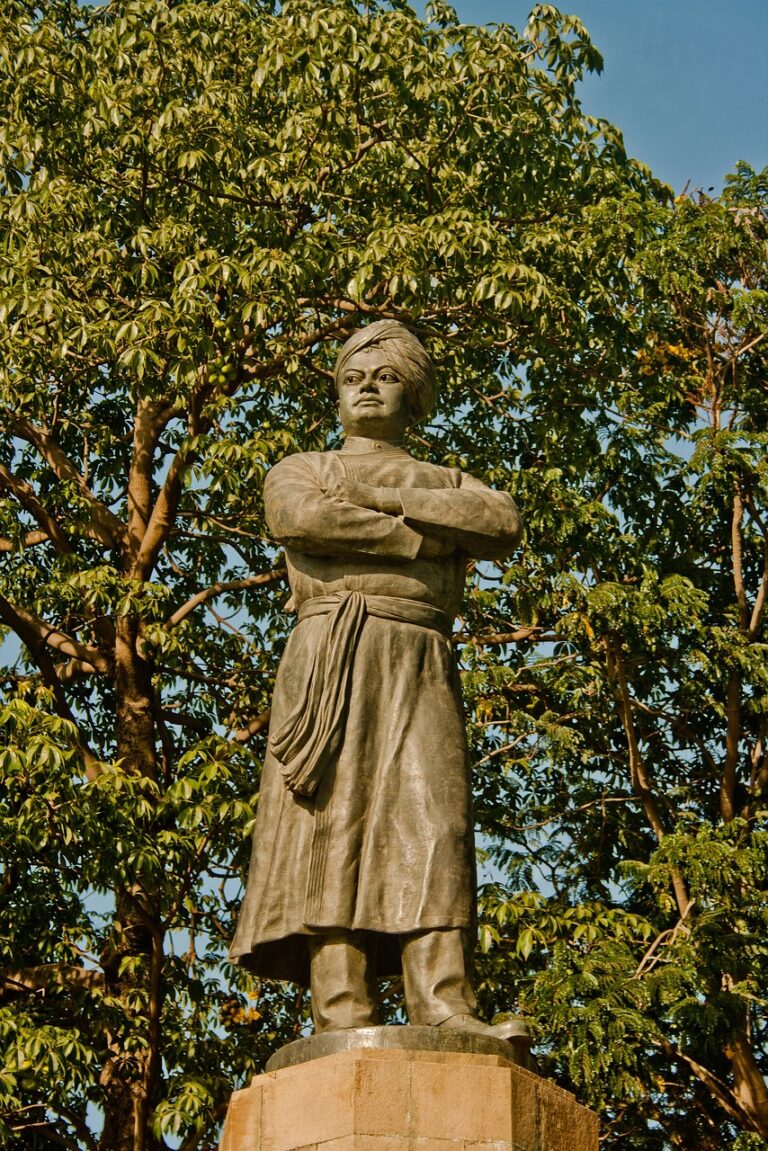
Defence Minister Rajnath Singh, External Affairs Minister, Dr. Subrahmanyam Jaishankar with the US Secretary of State, Mike Pompeo and the US Defence Secretary, Dr. Mark T. Esper after the India-USA 2+2 Dialogue, in New Delhi today
New Delhi: India and the USA today signed the Basic Exchange and Cooperation Agreement for Geo-spatial Cooperation, BECA, that will provide India access to extremely accurate geo-spatial data including nautical and aeronautical charts that will have several military applications.
Following India- USA 2+2 meeting today between the visiting US Secretary of State Michael R. Pompeo and US Secretary of Defence Dr. Mark T. Esper, and Indian Defence Minister Rajnath Singh and External Affairs Minister Dr. S. Jaishankar, Singh said signing of BECA today was a “significant achievement”.

After the meeting today, both Pompeo and Dr. Esper called on the Prime Minister Narendra Modi today and conveyed the U.S. Government’s continued interest in building stronger relations with India and working together to realize the shared vision and goals.
India and US had earlier signed Logistics Exchange Memorandum of Agreement, LEMOA in 2016 (A pact that allows both countries access to designated military facilities for the purpose of refuelling and replenishment in primarily four areas — port calls, joint exercises, training and humanitarian assistance and disaster relief), and Communications Compatibility and Security Agreement, COMCASA, in 2018.
Also read: India-US to to sign BECA for access to extremely accurate geo-spatial data, on October 27
The Ministers expressed satisfaction at the ongoing progress in the implementation of LEMOA and COMCASA, including the expansion of secure communications capabilities to include secure video teleconference capabilities between their respective Navies, Armies and Air Forces as well as between respective Foreign and Defense Ministries. The Ministers welcomed the convening of the Military Cooperation Group (MCG) later this year to review bilateral military-to-military engagement including joint exercises, training and expert exchanges. They looked forward to interaction between the Special Forces of India and the United States.
The USA also accepted India’s request for cooperation in the advanced field of maritime domain awareness. Both sides agreed to comprehend the requirements and initiate processes for joint development of requisite systems and expertise.
In today’s meeting both sides also explored probable capacity building and other joint cooperation activities in third countries, “including our neighbourhood and beyond”. Singh said both had convergence of views on a number of such proposals and would take those forward.
Singh informed that the 2+2 meeting had comprehensive discussions on key aspects of our bilateral and multilateral cooperation. “We considered the major challenges we face. The need for quick economic recovery and growth, prevention of the Pandemic, rebuild the global supply chains and related issues received obvious priority in our discussions,” Singh said.
Yesterday, Singh had met Dr. Esper to discuss bilateral defence issues. “We continued our discussions on larger regional and global perspective today over the 2+2,” Singh said.
“In our meeting, we shared assessment of the security situation across the Indo Pacific. In that process, we reaffirmed our commitment to peace, stability and prosperity of all countries in this region. We also agreed that upholding the rules based international order, respecting the rule of law and freedom of navigation in the international seas and upholding the territorial integrity and sovereignty of all states are essential. Our defence cooperation is intended to further these objectives. Both sides welcomed Australia joining the forthcoming Malabar Exercise,” Singh said. This is significant in view of the growing ambitions of China in the Asia pacific as well as the recent Indian and Chinese army build up along the Line of Actual Control.
Highlighting the importance of securing the economic and security interests of all stakeholders having a legitimate interest in the region, the Ministers welcomed the growing understanding on the Indo-Pacific among like-minded countries. They reaffirmed that closer India-U.S. cooperation will support shared interests in promoting security and prosperity in the Indo-Pacific region and beyond. They also emphasized that the Code of Conduct in the South China Sea should not prejudice the legitimate rights and interests of any nation in accordance with international law.
The ministers expressed their support for sustainable, transparent, quality infrastructure development in the Indo-Pacific region. They looked forward to furthering collaboration between USAID and India’s Development Partnership Administration (DPA) with a view to undertaking joint projects in the region. The Ministers welcomed the establishment of a permanent presence of the U.S. International Development Finance Co-operation (DFC) in India this year. The United States expressed strong support for the Coalition for Disaster Resilient Infrastructure (CDRI) as a leading mechanism for promoting regional economic development. Recognizing the need to contain the build-up of sovereign debt in developing and low-income countries by ensuring responsible, transparent, and sustainable financing practices for both borrowers and creditors, the Ministers looked forward to exploring ways to cooperate under the Blue Dot Network. They also looked forward to the Second Indo-Pacific Business Forum (IPBF) to be held on October 28-29, 2020.
Building on a strong record of peacekeeping cooperation, the Ministers decided to expand joint capacity building efforts with partner countries in the Indo-Pacific and to participate in multilateral peacekeeping training exercises.
Singh said both India and US had a “very constructive dialogue” and both will continue to work together to “strengthen our engagement in defence security and other areas”.
They also welcomed enhanced maritime information sharing and maritime domain awareness between their Navies and affirmed their commitment to build upon existing defense information-sharing at the joint-service and service-to-service levels and explore potential new areas of mutually beneficial cooperation.
The ministers reaffirmed their commitment to deepening bilateral defense consultation and collaboration and to exploring opportunities to expand cooperative capacity-building efforts with partners across the region. They also affirmed their commitment to pursue increased cooperation between the Indian military and U.S. Central Command and Africa Command, including broader participation in exercises and conferences, so as to promote shared security interests. The U.S. appreciated India’s leadership in establishing an Information Fusion Centre for the Indian Ocean Region (IFC-IOR). The Ministers welcomed the positioning of a Liaison Officer from the U.S. Navy at the IFC-IOR and the positioning of an Indian Liaison Officer at NAVCENT, Bahrain and reiterated their intent to assign additional Liaison Officers.
In the Defence Industrial Cooperation area, the ministers had a “very candid and useful discussion”wherein Singh highlighted the capabilities of Indian Defence Industry and their usefulness in the supply chain of major US platforms and systems. “We have identified priority Near-Term projects for joint development between respective agencies, which need to be fast tacked under the DTTI and resolved to work together in Defence R&D more efficiently,” he later disclosed.
Both sides welcomed the recent convening of the Second Australia-India-Japan-United States Quadrilateral Ministerial Meeting in Tokyo on October 6, 2020.They appreciated the exchange of views on regional issues of mutual interest, as well as ongoing cooperation related to maritime security, humanitarian assistance and disaster relief, regional connectivity, health security and counter terrorism. They also welcomed the fact that these Consultations would now be held annually. They expressed their support for further strengthening Quad cooperation through expanded activities, including initiating a dialogue among the development organisations of partner countries.
The ministers further welcomed efforts to rejuvenate and expand bilateral India-U.S. trade in the wake of the COVID-19 pandemic. In this regard, they noted ongoing discussions by the United States Trade Representative and India’s Ministry of Commerce and Industry to reach an understanding on improving market access, removing barriers to trade, and improving the business environment.
They also expressed their satisfaction over the “significant strides” made under the four Pillars of the Strategic Energy Partnership (SEP) covering Oil & Gas, Power and Energy Efficiency, Renewables and Sustainable Growth. They appreciated the progress made under the India-U.S. Gas Task Force and the launch of industry-led projects, and welcomed the announcement of new priorities and roadmap for each of the Pillars during the Ministerial meeting of the SEP held on July 17, 2020. With the objective of intensifying cooperation in the area of Strategic Petroleum Reserves (SPRs), the ministers welcomed the signing of the Memorandum of Understanding in this regard.
Recalling the historic India-U.S. Civil Nuclear Agreement, the Ministers welcomed the project Division of Responsibility principles between Nuclear Power Corporation of India Limited (NPCIL) and Westinghouse Electric Company (WEC) for the construction of six nuclear reactors at Kovvada, and looked forward to the detailed Division of Responsibility that would pave the way for a techno-commercial offer. The Ministers also welcomed the extension of the MoU between the Government of India and the Government of the United States of America concerning cooperation with India’s Global Centre for Nuclear Energy Partnership (GCNEP).
While welcoming the virtual convening of the 17th meeting of the India-U.S. Counter Terrorism Joint Working Group and the 3rd Session of the India-U.S. Designations Dialogue on September 9-10, 2020, they denounced the use of terrorist proxies and strongly condemned cross border terrorism in all its forms. They emphasised the need for concerted action against all terrorist networks, including al-Qaeda, ISIS/Daesh, Lashkar-e-Tayyiba (LeT), Jaish-e-Mohammad (JeM) and Hizb-ul-Mujahideen. The ministers called on Pakistan to take immediate, sustained and irreversible action to ensure that no territory under its control is used for terrorist attacks, and to expeditiously bring to justice the perpetrators and planners of all such attacks, including 26/11 Mumbai, Uri, and Pathankot. The Ministers also committed to continued exchange of information about sanctions and designations against terror groups and individuals, particularly in light of recent legislative changes in India, as well as countering the financing and operations of terrorist organizations, countering radicalism and terrorist use of the internet, cross-border movement of terrorists, and prosecuting, rehabilitating, and reintegrating returning terrorist fighters and family members.
Expressing their intention to enhance their ongoing cooperation in multilateral fora, including the UN, both sides also reaffirmed their support for the early adoption of a UN Comprehensive Convention on International Terrorism (CCIT) that will advance and strengthen the framework for global cooperation and reinforce the message that no cause or grievance justifies terrorism.
In view of the announcement made during President Trump’s visit to India to establish a new India-U.S. Counter-Narcotics Working Group, the ministers welcomed the proposal to convene the first such virtual meeting later this year, with an in-person meeting in 2021, to enhance cooperation between Indian and U.S. drug and law enforcement agencies. They welcomed efforts by the U.S. Department of Homeland Security and India’s Ministry of Home Affairs to reinvigorate the Homeland Security Dialogue.
They also welcomed the virtual convening of the India-U.S. Information and Communication Technology (ICT) Working Group on October 1, 2020. They reaffirmed their commitment towards an open, reliable and secure internet as well as the multi-stakeholder model of internet governance. They emphasized fostering cooperation between their industry and academia for an open, secure and resilient supply of strategic material and critical infrastructure and to independently evaluate the risk associated with deployment of emerging ICT technologies, including 5G networks.
The ministers also welcomed the recent convening of the annual India-U.S. Cyber Dialogue on September 15, 2020 and the first India-U.S. Defence Cyber Dialogue on September 17, 2020.
Recalling their countries’ proud record of achievement in space science and satellite application, both countries applauded the ongoing collaboration between the Indian Space Research Organization (ISRO) and National Aeronautics and Space Administration (NASA), including on the NASA-ISRO Synthetic Aperture Radar (NISAR) satellite scheduled to be launched by 2022. The Ministers also looked forward to sharing Space Situational Awareness information, which will catalyze efforts to create the conditions for a safe, stable, and sustainable space environment. They also expressed the intent to continue the India-U.S. Space Dialogue as well as discussions on areas of potential space defense cooperation.
The ministers welcomed the signing of a Memorandum of Understanding (MoU) for Technical Cooperation in Earth Observation and Earth Sciences between the Indian Ministry of Earth Sciences and the U.S. National Oceanic and Atmospheric Administration for developing a better understanding of the regional and global weather origins in the Indian Ocean and advancing common research goals in meteorology, oceanography, and management of living marine resources. They alsowelcomed the signing of an Agreement between India’s Department of Post and the United States Postal Service, which will facilitate the electronic exchange of customs data related to postal shipments, and applauded the signing of the Letter of Intent (LoI) between the Indian Central Council for Research in Ayurvedic Sciences, Ministry of AYUSH and the Office of Cancer Complementary and Alternative Medicine, U.S. Department of Health and Human Services.
They further applauded the exemplary cooperation between India and the United States in confronting challenges emerging from the COVID-19 pandemic. They reiterated their resolve to strengthen cooperation in the development of vaccines, therapeutics, diagnostics, ventilators and other essential medical equipment.
“We had a very constructive dialogue and will continue to work together to strengthen our engagement in defence security and other areas,” Singh said.
– globalbihari bureau





